Physical Address
304 North Cardinal St.
Dorchester Center, MA 02124
We independently evaluate and recommend products we believe will benefit our readers. If you purchase through links on this page, we may earn a commission.
Written By:

Published On: July 9, 2025
Last Updated On: January 3, 2026
Reviewed By:


Overthinking.
We’ve all been there—lying awake at night, replaying conversations that we have had earlier, imagining worst-case scenarios, questioning decisions we’ve already made. It feels like your mind won’t stop running, even when your body is exhausted. You feel exhausted because your brain is utilizing your energy for overthinking. Most of your energy is going into maintaining the overthinking process.
There was a time when I was also in the trap of overthinking. And if you’re here reading this, first of all, I want you to know: you’re not weak, broken, or alone. You’re simply human. Overthinking is something our minds are wired to do. But that doesn’t mean we have to stay stuck in that loop. Thinking is good, but overthinking is not.
Stoicism—a 2,000-year-old philosophy—has helped me and countless others find calm amidst mental chaos. The ancient Stoic philosophers, such as Marcus Aurelius, Epictetus, and Seneca, struggled with their anxious thoughts long before social media and modern distractions even existed. What they left behind wasn’t just a set of ideas—it was a way of life. A way to face uncertainty, fear, and the chaos of the mind with calm and clarity.
Stoicism teaches us to shift our focus from what we can’t control to what we can. It teaches us to pause, reflect, and respond, rather than react. And most importantly, it teaches us that peace isn’t found in having all the answers, but in letting go of the need to chase them.
In this guide, I’ll walk with you through the noise in your head—and share 10 Stoic ways to stop overthinking, and I’ll show you how Stoic ideas can help you break free from overthinking—not by fighting your thoughts, but by understanding them, accepting what you can’t change, and gently bringing your focus back to the present moment.
Let’s begin. Not with judgment, not with pressure—just with honesty, self-compassion, and a bit of ancient wisdom that still speaks powerfully to our modern minds.
Overthinking is what happens when your mind keeps spinning long after it has done its job.
You replay conversations, analyze situations from every angle, predict the future, imagine everything that could go wrong, and constantly second-guess yourself. It can feel like you’re trying to solve a problem that doesn’t even have a clear answer.
But let’s be clear—thinking isn’t the enemy, but overthinking is.
Thinking is what allows us to plan, reflect, and grow. But when thinking turns into rumination—when it becomes repetitive, fearful, and unproductive—it drains our energy and clouds our judgment.
From a Stoic point of view, overthinking is the mind’s attempt to control the uncontrollable—to grasp certainty in a world that offers none. We obsess over what someone might think of us, what might happen tomorrow, or how things should have gone differently. In doing so, we leave the present moment, where life is actually happening.
Also, psychology says, Overthinking is the act of dwelling excessively on past events, imagined scenarios, or future uncertainties, often leading to anxiety, insomnia, and mental fatigue[1]Research on overthinking and rumination.
Seneca, one of the great Stoic philosophers, once said:
“We suffer more often in imagination than in reality.”
 — Seneca
— SenecaThis is the heart of overthinking. Yes, we suffer more in imagination than reality. Most of the pain it brings isn’t caused by what’s happening now, but by what we imagine could happen, or what we believe should have happened. We give pain to ourselves for the things that don’t exist. This is the point where we have to pause and reflect on our thoughts and ask ourselves
The truth is, overthinking disconnects us from action. It paralyzes us with possibilities, but rarely leads to any solutions. And while it might feel like you’re being “careful” or “prepared,” often it’s just fear in disguise.
Here is the good news? You don’t have to silence your thoughts to find peace. You just need to see them more clearly, recognize what’s worth your attention, and gently let the rest go.
That’s where Stoicism comes in—and that’s exactly what we’ll explore next.
At its core, Stoicism is a philosophy of clarity, calm, and control—not over the world, but over yourself.
Stoicism, founded in the 3rd century BCE by Zeno of Citium, is a practical philosophy focused on living in harmony with nature, accepting what we cannot control, and cultivating inner virtue [2]Stanford Encyclopedia of Philosophy – Stoicism. Stoicism was practiced not just by philosophers like Epictetus, Seneca, and Marcus Aurelius, but by everyday people—soldiers, merchants, rulers, and workers who were trying to live a better life in an unpredictable world.
Stoicism teaches one simple truth:
You cannot control everything that happens to you, but you can always control how you respond.
That’s the foundation. Life will throw challenges your way—failure, rejection, heartbreak, uncertainty, and loss. You can’t stop those things from happening. But you can train your mind to face them with strength, reason, and peace, and actually, this is the thing that you have to learn.
Stoicism is not about suppressing emotions or pretending you don’t care, or even it is not about being cold or robotic. In fact, the Stoics deeply valued relationships, kindness, and justice. What they didn’t believe in was letting your emotions—especially fear and anxiety—control your actions.
They believed in living according to nature, which means living with reason, virtue, and acceptance. It means showing up for life without trying to bend reality to your will.
For the overthinker, Stoicism is a lifeline.
It gently reminds you: Don’t waste your mental energy on what you can’t control.
Instead, focus on your thoughts, your actions, and the present moment. That’s where your power lies. That’s where peace begins.
As Epictetus put it:
“Freedom is the only worthy goal in life. It is won by disregarding things that lie beyond our control.”
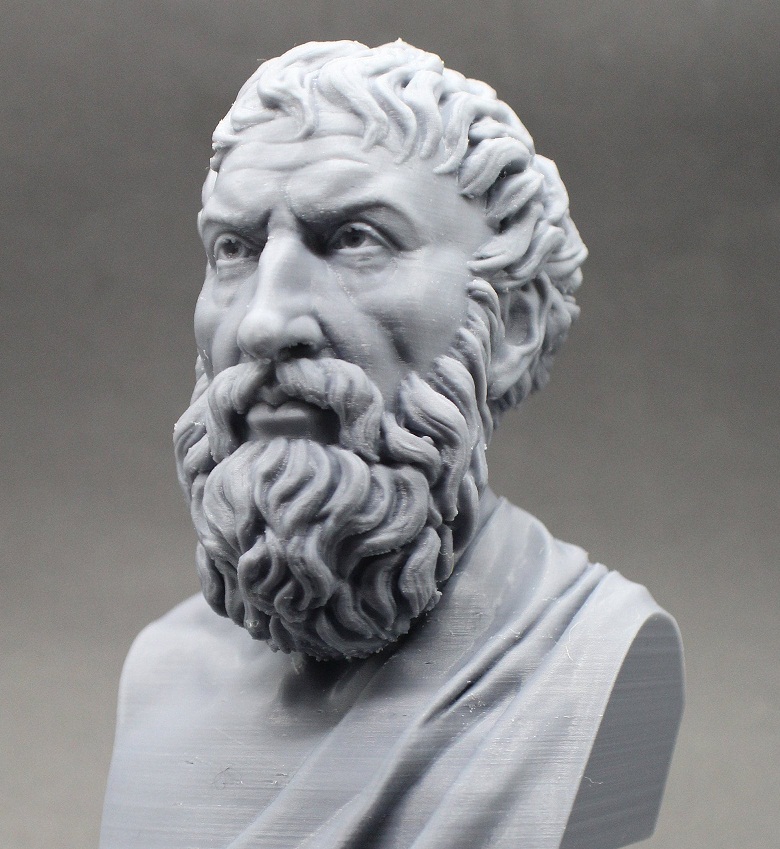




Now that you understand what Stoicism is, let’s explore how it can help you break free from the endless loop of overthinking, with 10 timeless and practical Stoic philosophies.
Overthinking often feels like trying to hold water in your hands—the tighter you grip, the more it slips away. When we repeatedly think about something, the mind becomes noisy, chaotic, and exhausting. We keep thinking because we believe more thinking will lead to clarity. But in reality, it often just leads to anxiety, indecision, and mental fatigue.
This is where Stoicism offers a breath of fresh air. Not by telling you to stop thinking, but by showing you how to think clearly, focus wisely, and live peacefully.
Here’s how Stoic philosophy helps combat overthinking in a practical, compassionate way:
The foundation of Stoicism is this simple truth:
“Some things are up to us, and some things are not.”





Most of our overthinking comes from trying to control things we were never meant to control:
– What people think of us
– What might happen tomorrow
– Whether the outcome will be perfect
– If we made the “right” decision
– Is my girlfriend/boyfriend talking to someone else?
Stoicism teaches us to draw a clear line between what is within our control—our thoughts, our actions, our choices—and what is not—other people’s opinions, the future, the past, or external events.
When you start focusing only on what you can control, your energy becomes purposeful, and your mind becomes calmer. It’s not about giving up—it’s about letting go of the illusion that you must control everything to feel safe.
This is the first step to freedom from overthinking.
Amor Fati means “love of fate.” It’s the Stoic idea of embracing whatever happens—not just accepting it, but loving it, even when it’s difficult.
Overthinking is often the mind’s resistance to uncertainty. We want to predict the future, avoid mistakes, and guarantee outcomes. But life doesn’t work that way as you want.
The Stoics remind us that everything is temporary—our feelings, our circumstances, our relationships, even our worries. Instead of fighting what we cannot know or change, we can lean into it with grace.
Marcus Aurelius wrote:
“What happens to you has been waiting to happen since the beginning of time.”
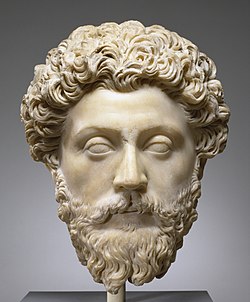













This perspective softens the edges of our anxiety. It teaches us to trust the flow of life, to release the need for perfect control, and to meet uncertainty not with fear, but with calm acceptance.
The Stoics didn’t use the word “mindfulness,” but they practiced it every day.
They believed in grounding themselves in the now, because overthinking lives either in the past (regret) or the future (worry).
“Do not let your imagination be crushed by life as a whole. Stick with the present moment.”














The present moment is where your power lives.
You can’t act in the past or the future—you can only act now. When you bring your attention back to what’s in front of you, overthinking loses its grip [3]Mindfulness and its impact on rumination. Even small actions—deep breathing, writing your thoughts down, taking a walk, or saying, “Right now, I’m okay”—can reconnect you to the present and break the mental loop.
This is the Stoic way of mindfulness: clear, intentional presence.
Many times, we overthink because we’re afraid of how we’ll be seen.
– “What will they think?”
– “Did I say something wrong?”
– “Will they like me if I do this?”
The Stoics saw this need for approval as a trap. They taught that true peace comes from living according to your values, not other people’s expectations.
“It never ceases to amaze me: we all love ourselves more than other people, but care more about their opinions than our own.”














When you stop measuring your worth based on how others respond, you reclaim your mental space. You stop trying to read minds, please, everyone, or prove yourself.
Letting go of external validation isn’t arrogance—it’s self-respect.
And with that self-respect comes clarity, confidence, and a quieter mind.
Stoicism doesn’t ask you to shut down your thoughts. It simply teaches you how to see them wisely, focus on them intentionally, and let go of what weighs you down.
When you focus on what you can control, accept the flow of life, stay present, and stop seeking constant approval, you begin to step out of the overthinking loop and into a state of calm, focused living.
Now, let’s get even more practical.
Below, I’ll walk you through 10 Stoic ways to stop overthinking, the Stoic practices that you can use today to find peace in a noisy mind.
For a long time, I was someone who overanalyzed everything—conversations, decisions, the future. I wanted things to be perfect, certain, and safe. But all that thinking just left me anxious and mentally drained.
Then I found Stoicism.
It didn’t “fix” me. It didn’t make me emotionless. But it taught me how to think differently—how to separate what matters from what doesn’t, how to respond instead of react, and how to come back to the present moment when my mind was running wild.
And now I want to share that with you.
What follows are 10 Stoic ways that have helped me—and many others—step out of the overthinking loop and into a more grounded, peaceful mindset. Each one is simple. Easy to practice and adopt.
Let’s walk through them together—no pressure, just progress.
Imagine standing in a storm. The wind is wild, the rain is pouring, and you’re getting soaked. You can’t stop the storm. But you can choose how you stand in it—calm, grounded, and steady.
This is the core principle of the Dichotomy of Control.
“Some things are up to us, and some things are not.”





In simple terms, this Stoic idea teaches us to divide our world into two clear categories:
– Our thoughts
– Our actions
– Our attitude
– Our choices
– Our values
– What others think or do
– The outcome of situations
– The past
– The future
– Unexpected events
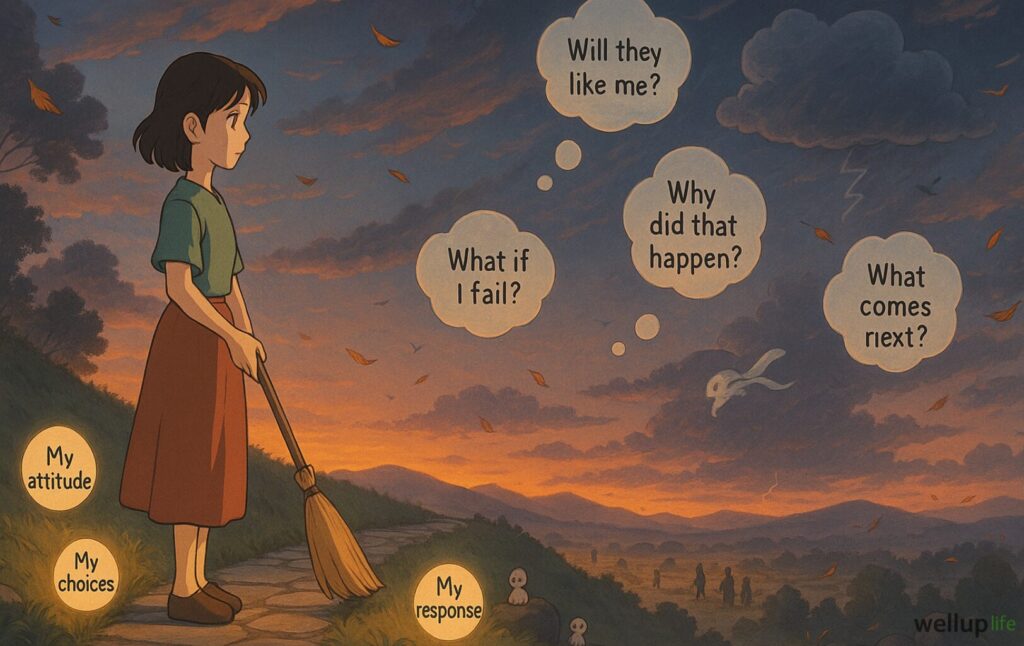

When you’re stuck in overthinking, it usually means you’re trying to control something from the second list mentally.
– “What if I fail?”
– “Will they like me?”
– “Did I make the wrong choice?”
– “Is he/she cheating on me?”
These thoughts pretend to be helpful, but they’re just spinning wheels in your mind. They drain your energy, but change nothing.
Now here’s the shift: instead of obsessing over the outcome, focus on your effort. Instead of worrying about others’ opinions, focus on your integrity. Instead of fearing the unknown, focus on how you’re showing up right now.
This doesn’t mean you stop caring—it means you stop clinging.
You start living from the inside out, not the outside in.
The next time your mind starts racing, pause and ask yourself: “Is this within my control?”
– If yes, take a small, clear action.
– If no: take a deep breath and let it go.
This small habit—applied again and again—is the beginning of inner peace.
What if the worst actually happens?
That question scares most people. But the Stoics didn’t run from it—they walked straight into it, and in doing so, they found peace.
Premeditatio Malorum is a Stoic practice that means “the premeditation of evils.” It might sound dark at first, but it’s actually a tool for emotional clarity. It teaches you to imagine possible challenges or worst-case scenarios before they happen—not to scare yourself, but to prepare yourself with calm and courage.
“He robs present ills of their power who has perceived their coming beforehand.”




Think of it like mental armor.
Overthinking often stems from the fear of what might go wrong. We try to protect ourselves by obsessing over every possible outcome. But what if, instead of running from that fear, you sat with it?
What if you calmly asked yourself:
– What’s the worst that could happen?
– If it did happen, how would I handle it?
– Would I still survive? Grow? Adapt?
You’ll usually find that even in the worst case, you’re more resilient than you think.
When you bring your fear into the light, it loses its power.
You stop spinning in vague “what ifs” and start grounding yourself in reality.
Premeditatio Malorum teaches your mind that you don’t need to fear the unknown—you just need to be ready to face it with reason, strength, and grace.
This doesn’t mean becoming negative or expecting failure.
It means being mentally prepared so that your focus stays on action, not panic.
Next time you catch yourself worrying obsessively, try this quiet exercise:
Over time, this practice rewires your fear into calm confidence.
(Let Go of the Past. Stop Fearing the Future. Return to Now.)
Overthinking rarely lives in the present moment.
It lives in the past—regret, guilt, “Why did I say that?”
Or it lives in the future—worry, fear, “What if everything goes wrong?”
But the truth is, right now is all you ever have.
And Stoicism invites you to return to it again and again.
Marcus Aurelius wrote in his journal (what we now call Meditations):
“Confine yourself to the present.”














He wasn’t giving poetic advice. He was reminding himself—during plagues, war, and stress—that the mind finds peace only when it stops wandering.
In many ways, the Stoics were the original mindfulness teachers. They didn’t sit cross-legged with incense, but they practiced something deeper: awareness of thought, presence of mind, and full engagement with the moment in front of them.
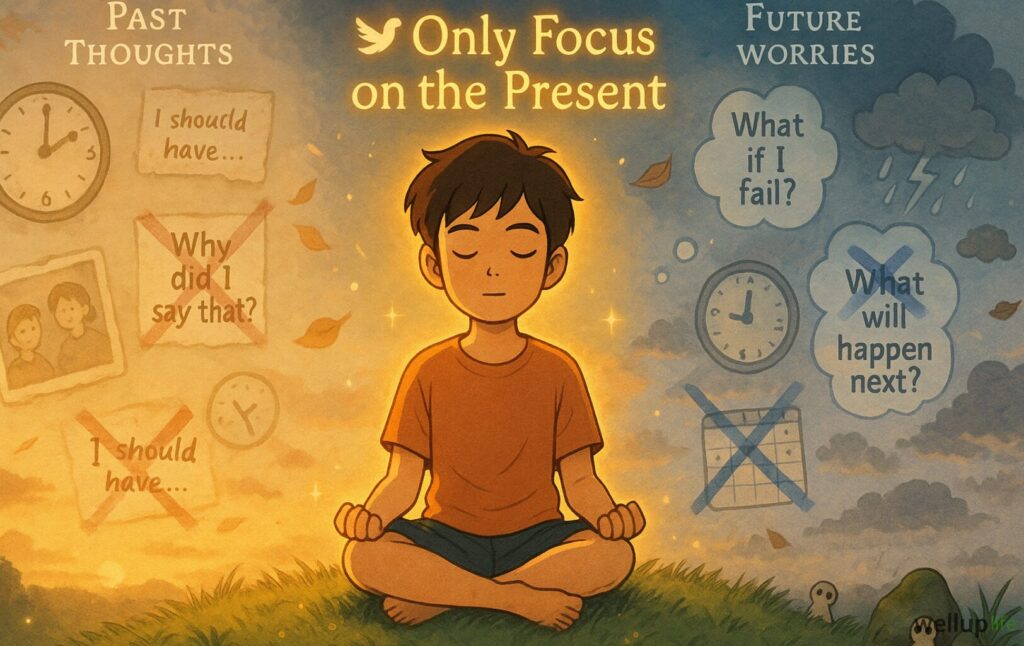

Overthinking pulls you away from what is and traps you in what-ifs.
Mindful Stoicism pulls you back to this moment, where action is possible, where reality is clear, and where your mind can finally breathe.
When you are fully present, even if just for a few seconds, your mental noise softens. The spiral breaks. You’re no longer tangled in thoughts—you’re grounded in life.
That’s it. You’ve just practiced Stoic mindfulness. Simple, real, powerful.
And multiple studies have shown that mindfulness-based approaches reduce rumination and anxiety [4]Mindfulness reduces anxiety and overthinking.
Stoicism isn’t about being “zen” all the time.
It’s about catching yourself when you drift, and gently bringing your attention back to where it belongs: the present. Because that’s where clarity lives, that’s where peace begins.
(You Don’t Need Everyone’s Approval to Be at Peace)
A lot of overthinking starts with one silent fear:
“What will they think of me?”
We overanalyze our words, our choices, and our appearance.
We replay moments, not because we feel unsure, but because we worry about how others might have judged us.
But here’s the truth, the Stoics knew deeply:
Peace begins when you stop outsourcing your self-worth.
“It never ceases to amaze me: we all love ourselves more than other people, but care more about their opinions than our own.”














When your sense of self depends on external validation, your mind becomes a courtroom—constantly trying to prove itself, defend itself, and avoid being “wrong” in someone else’s eyes.
You overthink because you’re afraid of being misunderstood.
You fear judgment, rejection, and embarrassment.
But Stoicism invites you to take your power back.
The Stoics believed that your only true responsibility is to live with integrity, according to your own values, not others’ opinions.
You are not here to impress. You are here to live rightly.
“If you are ever tempted to look for outside approval, realize that you have compromised your integrity. Be satisfied if your conscience approves.”





This doesn’t mean being rude or indifferent. It means being rooted—so that praise doesn’t inflate you, and criticism doesn’t break you.
When you let go of needing everyone to agree, admire, or understand you, your mind becomes quieter. You make decisions faster. You live more freely.
Next time you catch yourself spiraling with thoughts like:
“Did I say the wrong thing?”
“Do they like me?”
“Should I explain myself again?”
Pause and ask:
→ “Am I living by my values?”
→ “Would my highest self approve of this choice?”
If the answer is yes, breathe. Let the rest go.
You don’t need everyone to understand you to move forward.
You just need to be true to yourself.
When you stop needing external validation, your mind no longer works overtime trying to “win approval.“
Instead, it begins to rest in what matters most: your own character, your own choices, your own peace.
(Write to Untangle the Mind and Strengthen the Soul)
When your thoughts feel heavy, scattered, or tangled, write them down.
Not for likes, not for anyone else—just for you.
This is exactly what Marcus Aurelius did nearly 2,000 years ago.
He didn’t journal to look wise or sound profound. He did it to clear his mind, examine his thoughts, and stay aligned with his values.
His private writings, now known as Meditations, were simply pages of self-reflection. He wrote honestly about fear, frustration, temptation, and purpose.
He wasn’t a perfect man. He was a thinking man trying to live rightly.
“People look for retreats for themselves… but nowhere can a man find a retreat more peaceful or more free from trouble than his own soul.”














That’s what journaling gives you—a quiet retreat in the middle of a noisy life.
Overthinking thrives in the mind because it’s unstructured—thoughts loop, overlap, and escalate.
But when you write them down, something powerful happens:
They slow down.
They become visible.
They lose their emotional grip.
Journaling helps you observe your thoughts, instead of becoming them. It shifts you from emotional reactivity to conscious clarity. Studies show journaling can reduce anxiety, improve mental clarity, and regulate emotions [5]Journaling as a mental health tool.
You don’t need fancy tools. Just a notebook, a pen, and a few quiet minutes. Try one of these Stoic-style prompts:
There are no rules. The goal isn’t perfection—it’s perspective.
Over time, journaling becomes your mirror and mentor. It shows you where you’ve grown and where you still get stuck. And it reminds you that every day is a fresh opportunity to live with wisdom.
Before bed, open a blank page and write for just 5 minutes.
Let your thoughts pour out without judgment. Don’t worry about grammar or structure. Just release.
Then close your notebook, breathe deeply, and rest, knowing your thoughts are safely outside your mind for the night.
Journaling like Marcus Aurelius isn’t about being a philosopher.
It’s about being a human who wants to understand themselves and live with clarity.
And in that quiet act of writing, overthinking begins to lose its power.
(Strengthen Your Mind by Choosing Challenge)
One of the most surprising ways to stop overthinking is not through comfort, but through challenge.
In Stoicism, there’s a practice called voluntary discomfort—the deliberate act of stepping outside your comfort zone. Not because you want to suffer, but because you want to grow stronger than your fears.
“Set aside now and then a number of days during which you shall be content with the scantiest and cheapest fare, with coarse and rough dress, saying to yourself the while: ‘Is this the condition that I feared?”




The idea is simple: when you choose discomfort on your own terms—cold showers, skipping luxuries, waking up early, walking instead of riding—your mind becomes more resilient. You realize you’re capable of far more than you thought.
Overthinking often comes from mental fragility—from a fear of being uncomfortable, uncertain, or challenged. Voluntary discomfort is Stoicism’s way of saying:
“Train in peace for what life may ask of you in war.”
Overthinkers often fear the unknown because they haven’t built proof of their inner strength. But when you regularly step into discomfort—by choice—you create evidence that you can handle more than your mind tells you. Voluntary discomfort builds psychological resilience and reduces fear-based overthinking [6]Voluntary discomfort and stress inoculation.


Each time you do something difficult on purpose, you quiet the voice of anxiety.
You replace the question “Can I handle it?” with the answer:
“I already am.”
These aren’t punishments—they’re training grounds for peace. They build courage, patience, humility, and self-control.
Pick one small act of voluntary discomfort today.
Do it with intention. Before and after, ask yourself:
→ “What did I fear?”
→ “Was it truly as bad as I imagined?”
You’ll often find the answer is no.
And with that small win, your mind begins to trust itself.
You don’t need to live in suffering to be Stoic.
But you do need to practice facing discomfort with grace, because that’s what turns overthinking into grounded confidence.
(Remember You Will Die — And That’s Why Life Matters Now)
It sounds intense, doesn’t it?
“Memento Mori” — Latin for “Remember, you must die.”
But the Stoics didn’t dwell on death to be dark or depressing.
They reflected on it to wake up to life.
“You could leave life right now. Let that determine what you do, say, and think.”














When you’re caught in overthinking, your mind is often tangled in trivial things—what someone said, what might happen, whether you looked perfect.
But when you remember that time is limited, everything changes.
You stop obsessing.
You stop postponing joy.
You start living with intention.
Overthinking gives weight to things that often don’t matter in the long run.
– That awkward text
– That imperfect reply
– That missed opportunity
But when you remember you have a finite number of days, you naturally shift your focus to what truly matters—kindness, courage, creativity, connection, peace.
Memento Mori isn’t morbid. It’s motivating.
It reminds you that the present moment is not guaranteed, and that worrying is one of the worst ways to spend the precious time you have.
When you feel overwhelmed by thoughts, gently ask yourself:
→ “If I had only a year left to live, would this still matter?”
→ “Would I still be thinking about this on my last day?”
If the answer is no, let it go.
If the answer is yes, act on it. But do so with grace, not fear.
At the end of the day, reflect briefly:
You don’t have to fear death to love life more deeply.
You just have to remember it.
So next time your mind starts spinning in circles, pause and remember:
Memento Mori.
Life is short. Let your thoughts serve your purpose, not your panic.
(Let the Mind Breathe Before It Spirals)
Overthinking often looks like this:
You get an idea. You hesitate. You question it. You doubt it.
You keep thinking, but never act.
The Stoics understood that the mind tends to complicate what the heart already knows. That’s why they practiced a powerful form of self-discipline: delaying judgment, not movement.
“If you are distressed by anything external, the pain is not due to the thing itself, but to your estimate of it—and this you have the power to revoke at any moment.”














In short: Don’t trust every thought.
Don’t feed every mental loop.
And most importantly, don’t wait forever to act on what matters.
Overthinking tricks us into believing we need more clarity before we move. But clarity doesn’t always come before action—it often comes through it.
By choosing movement before mental overanalysis, you start freeing yourself from the habit of waiting for “perfect certainty.”
Let the thought sit. Let the doubts pass. But don’t let your values be delayed.
Let’s say you have a decision to make:
→ You’ve thought about it already.
→ You know what aligns with your values.
→ But your brain is now looping.
Try this:
→ Set a 5-minute timer.
→ Delay judgment. Let thoughts come and go. Don’t engage.
→ When the timer ends—act. Just one small step. A message. A “yes.” A “no.” A start.
After giving yourself a short mental pause (like using a 5-minute timer to calm the overthinking), you don’t let yourself fall back into more rumination. Instead, you take one small action—a simple, clear decision that moves you forward.
A small action can be:
The idea is: after the pause, don’t go back to looping thoughts—just begin. Any tiny, value-driven action helps break the spiral of indecision and builds clarity through movement.
By delaying the storm, not the step, you create space between thought and action—and that’s where peace grows. Studies also show that delaying judgment and creating cognitive distance can improve emotional regulation [7]Psychological distancing reduces emotional reactivity.
You don’t have to silence every thought to act with wisdom.
You just have to stop letting thoughts stall your life.
When in doubt, the Stoics teach us:
→ Pause the noise. Trust your training. Take the step.
(Shift Your Perspective to Regain Inner Peace)
Overthinking feels big.
The thought. The worry. The moment. It consumes your mental space until it becomes your whole world.
But what if you could zoom out?
One of the most beautiful and humbling Stoic practices is called the View from Above. It’s a simple reflection—imagining yourself rising above your situation, your life, even the Earth itself—to see things from a wider lens.
“Consider the whole of time and the whole of substance, and see that each individual thing is as a grain of sand in comparison.”














Overthinking thrives when you’re stuck in the small.
A text message. A comment. A tiny decision.
It feels massive because you’re standing too close to it.
The View from Above pulls you back. It shows you:
– This moment is just one of thousands.
– This fear is not your whole identity.
– The world is vast, and life is short.
From this higher place, you can breathe again.
You stop clinging. You stop spiraling. You remember what matters.
When your mind is tangled, close your eyes and imagine this:
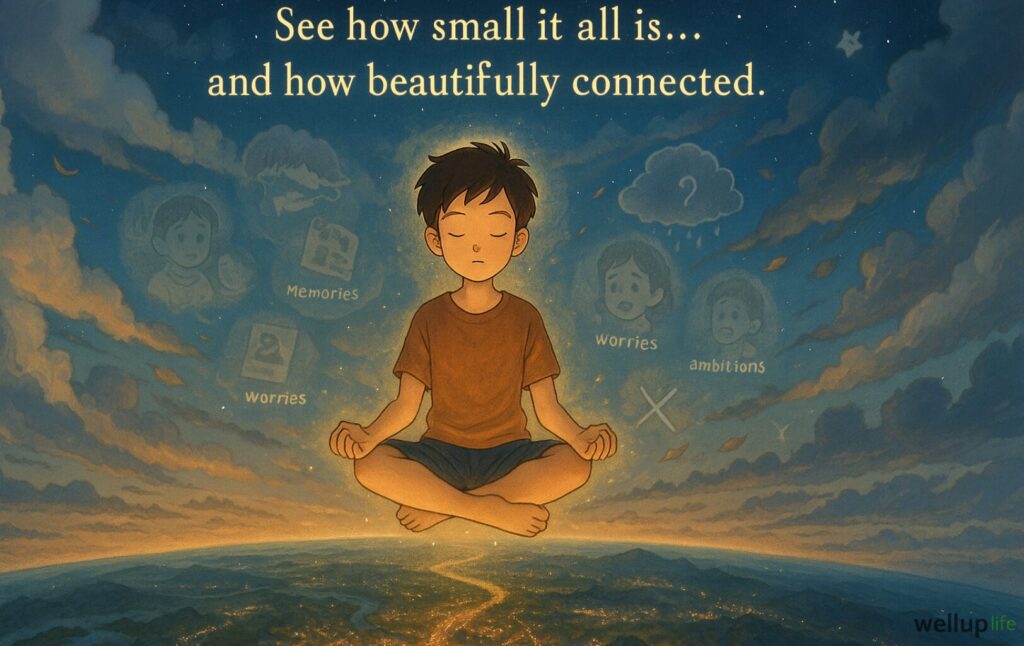

Now gently ask:
→ “Will this thought still matter in a week? A year? At the end of my life?”
→ “What’s truly important right now?”
You’ll feel the shift.
Not because the problem vanishes, but because your attachment to it softens. This kind of perspective-taking has been shown to reduce self-focused rumination and promote empathy and broader thinking [8]Perspective-taking and cognitive reappraisal.
This practice doesn’t make you cold or detached—it makes you wise.
It helps you put life back into perspective:
You are a part of something far bigger. Your time here is precious. Your energy is sacred. Don’t waste it trapped in thoughts that will fade.
You don’t need to carry the whole world—just your part of it.
And even that, you can carry lightly.
(Choose Progress Over Performance, and Peace Over Pressure)
Overthinking often comes from a quiet pressure we place on ourselves:
– I have to get this exactly right.
– I shouldn’t make mistakes.
– What if I mess this up?
This is the trap of perfectionism—an impossible standard that leads to hesitation, self-doubt, and endless mental spirals.
But the Stoics weren’t interested in perfection.
They were interested in virtue.
“If you seek tranquility, do less. Or more precisely, do what’s essential. Do it well. And stop. Most of what we do or say is not essential.”














Virtue in Stoicism means living in alignment with your highest self.
It’s not about flawlessness—it’s about character. Intention. Effort.
The four core Stoic virtues are:
When you live by these, perfection doesn’t matter anymore.
You’re no longer chasing approval—you’re becoming aligned.
Overthinking is often rooted in fear of failure.
But when you define success as living by virtue, there’s nothing to fear. You can’t fail at being wise, kind, courageous, or patient—so long as you keep showing up.
The Stoic goal isn’t to get life right in every detail.
The goal is to live a rightful life, moment by moment.
Next time you’re stuck in a loop, ask:
→ “What virtue is needed here?”
→ “Can I be honest? Kind? Brave? Humble?”
Then act—not to be perfect, but to be principled.
Over time, this becomes your compass.
You stop overthinking every move because your values guide the way. Even when things don’t go perfectly, you’ll know in your heart:
“I did the best I could, with the best I had, in the most honorable way I knew how.”
And that, truly, is enough.
You weren’t made to be perfect.
You were made to grow, to learn, to live with depth and direction.
Let go of the need to get everything “right.”
And instead, choose to live virtuously, intentionally, and freely.
Because that’s the Stoic path to peace.
(Simple Habits to Calm the Mind and Strengthen Your Spirit)
It’s one thing to understand Stoic ideas.
It’s another to live them—day by day, thought by thought.
The ancient Stoics didn’t just talk about philosophy. They practiced it—like daily mental training for the soul. And the good news? You can too. You don’t need hours of silence or ancient scrolls. You just need a few simple habits, done consistently, with intention.
Here are four timeless Stoic practices you can start today to reduce overthinking and create lasting mental clarity:
Start your day not by checking your phone, but by checking in with yourself.
“When you arise in the morning, think of what a precious privilege it is to be alive—to breathe, to think, to enjoy, to love.”














Before the noise of the world enters your head, take 5 minutes to reflect:
– What kind of person do I want to be today?
– What challenges might I face—and how can I respond with virtue?
– What’s within my control today?
This small habit sets the tone for everything that follows.
Related: How to Build a Morning Routine for Productivity and Happiness in 2025
At the end of the day, don’t just crash into sleep. Reflect. Process. Grow.
Like Marcus Aurelius, you can journal just for yourself—to review your thoughts, actions, mistakes, and wins.
Try asking:
– What did I overthink today, and why?
– Did I act with courage, kindness, or wisdom?
– What will I do differently tomorrow?
Even 5 minutes of honest writing can declutter your mind and bring inner peace. Mindful routines like journaling, reflection, and value-based living are all proven to help reduce overthinking [9]Positive effects of daily reflection and journaling.
Related: 7 Powerful Evening Routines to Relax Your Mind & Boost Productivity
Just like physical exercise strengthens your body, reading Stoic texts trains your mind.
Keep a copy of Meditations by Marcus Aurelius, Letters by Seneca, or The Enchiridion by Epictetus nearby. Even one passage a day can shift your mindset.
It reminds you:
– You’re not alone in your struggles.
– Many of your thoughts have already been thought centuries ago.
– Peace doesn’t come from having a perfect life, but from a disciplined mind.
Throughout the day, you’ll face triggers—delays, judgments, conflicts, and uncertainty.
Instead of reacting, pause. Observe. Detach.
Ask yourself in real time:
→ Is this worth my peace?
→ Is this in my control?
→ What virtue can I practice right now?
This is living Stoicism—not just in theory, but in traffic, in meetings, in conversations, in chaos.
You don’t need to master every Stoic idea to change your life.
You just need to return to yourself daily. With presence. With honesty. With a willingness to grow.
The mind clears when we stop letting thoughts run wild… and start guiding them with intention.
(How Stoic Thinking Breaks the Mental Loop)
Let’s step away from theory for a moment and into real life because Stoicism isn’t just philosophy for monks or emperors. It’s a practical tool you can use right now… even on a Tuesday afternoon, in a coffee shop, with your heart racing and thoughts spiraling.
Maya is a 29-year-old graphic designer.
She recently gave a presentation to her team about a rebranding project she led. After the meeting, her manager nodded but didn’t say much. Her co-worker left early. And that night, Maya’s mind started spinning:
“Did I talk too much?”
“Was my idea too risky?”
“They probably hated it… I probably looked stupid.”
She replayed the meeting in her head over and over.
She couldn’t sleep. She started drafting a long message to her manager to “explain her thinking”—just in case they misunderstood.


Before sending that message, Maya paused.
She remembered something she had read in Meditations:
“Don’t let your imagination be crushed by life as a whole… Stick with the situation at hand.”














So she took a breath.
She asked herself:
→ “What do I actually know?”
→ “What part of this is in my control?”
→ “Did I prepare honestly? Did I speak with clarity and respect?”
Yes. She had. The rest—her manager’s mood, her co-worker’s early exit—was outside her control.
She closed the draft message and let it go.
Not the situation. That was the same.
But Maya’s relationship to her thoughts had changed.
She stopped chasing reassurance and chose self-trust.
The next day, her manager called and said:
“Great work yesterday. I was just a bit distracted—family stuff. But you nailed the presentation.”
Maya didn’t control the outcome.
She didn’t know the full story.
But Stoicism gave her a powerful tool:
→ To pause the spiral
→ To ground herself in what was real
→ To let go of what wasn’t hers to carry
And that’s what Stoic thinking looks like—not cold detachment, but inner calm in the middle of uncertainty.
Whether you’re a designer, student, teacher, or parent, life will always give you chances to overthink. But Stoicism gives you something better:
The power to step back. To breathe. And to live by reason, not by fear.
(You Don’t Need to Master Every Thought—Just Meet Them with Wisdom)
Overthinking doesn’t mean you’re broken.
It just means you’re human, with a deep desire to get things right, to feel safe, to be understood. But trying to control every thought, every outcome, every opinion? It’s a battle you were never meant to win.
Stoicism doesn’t ask you to suppress your thoughts.
It teaches you to meet them with space, courage, and clarity.
To pause. To reflect. To choose your response—calmly, wisely, consistently.
“The happiness of your life depends upon the quality of your thoughts.”














You won’t always catch yourself in time. You’ll still spiral sometimes. But every time you remember to return to the present… every time you ask, “Is this in my control?”… Every time you choose virtue over perfection, you win a little more of your peace back.
And that’s the Stoic path.
Not the absence of thought, but the presence of inner discipline.
So today, start small.
→ Reflect in the morning.
→ Write in the evening.
→ Breathe when the mind spins.
→ Focus on what matters. Let the rest pass.
You don’t need to control everything to live well.
You just need to calm your inner world, so you can move through the outer one, one clear, grounded step at a time.
If you’re ready to stop overthinking, don’t try to control more.
Start letting go. Start living with purpose. Start living like a Stoic.
Read Next: 7-Days Self-Improvement Challenge (Free Printable)
Stoic Thinker
Nitin Yadav, Editorial Director and Review Board Member at Wellup Life, is a Stoic thinker who inspires personal growth through resilience, discipline, and clarity.


Medically Reviewed By:





Reviewed By:







Medically Reviewed By:





Reviewed By:







Reviewed By:





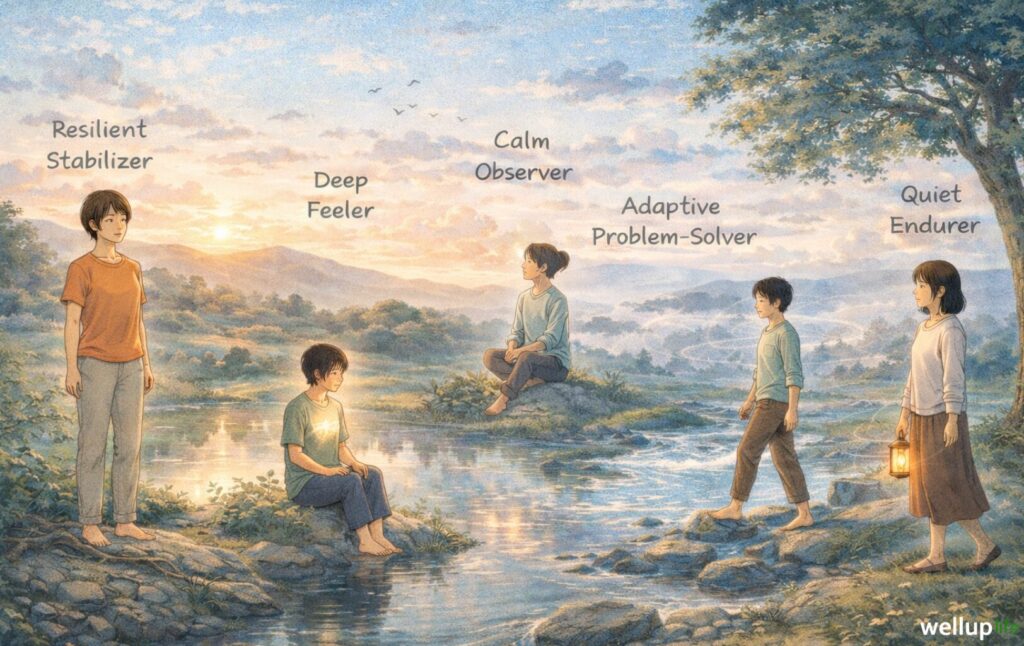

Reviewed By:







Reviewed By:



Medically Reviewed By:



Reviewed By:

Wellup Life is your space for personal growth, wellness, and mindful living. From self-improvement and productivity to spirituality and relationships, we share practical insights and timeless wisdom to help you live with clarity, balance, and purpose.
Copyright © 2024 – Wellup Life — All rights reserved
